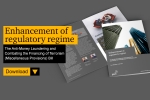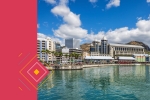Share this page:
Any issue that has the potential to put the future of our nation and its people in jeopardy merits a bold solution from national policy. At this point in our economic history, no issue is as prominent as climate change and the need for sustainable development.
Mauritius’ vulnerability to climate change and biodiversity loss has been largely documented. Our island will bear the consequences of rising temperatures, sea levels, intense natural calamities and nature degradation.
This Budget, like in previous years, is only skimming the surface of sustainability. The initiatives being proposed are trying to respond to our country’s climate commitment under the UN Paris Agreement but remain fragmented.
It also suggests that the Government’s green agenda centres largely around climate mitigation, with only a few measures like flood management and prevention of coastal erosion being aimed towards adaptation.
However, Mauritius being a relatively insignificant carbon emitter globally, the focus should be more on climate adaptation measures in order to build resilience in the face of the adverse impacts of a changing climate.
One of the most positive aspects of this budget is the announcement of a number of initiatives towards gender equality. Women are a key pillar of our society and the measures announced will contribute in a great way towards not only creating a resilient economy but a resilient and sustainable society.
The initiative of the Bank of Mauritius to develop a Carbon Trading Framework for both blue and green credits is an excellent measure. To succeed, this will now need to be designed and implemented well, and the right market will have to be developed through participation of all relevant stakeholders.
Key Sustainability measures announced in National Budget 2023 - 2024
Gender equality
Series of measures to connect women to opportunities, including listed companies to have a minimum of 25% of women on their boards.
Poverty alleviation
Minimum salary increased to MUR 15,000 per month.
Energy transition
Continued emphasis towards renewable energy including additional investment in approximately 86 Megawatt of solar projects.
Adapting to rising sea level
Rehabilitation and protection of 20 km of shoreline.
Afforestation
Planting of 1,000,000 trees.
To discover all the measures announced for the Sustainability sector, download our full Budget Brief.
Click here
On energy transition, like last year, a number of initiatives have been announced, which is a good thing. However, there is not a comprehensive energy transition strategy to meet the ambitious plan of achieving 60% renewable energy by 2030. More needs to be done in the next seven years towards this goal.
The measures announced towards the blue economy also fall short of expectations. The Government's aim to increase the share of GDP of our blue economy to 20% in the medium term is unlikely to be met under existing policy decisions.
A strategic and integrative framework is required with a new way of thinking about new sources of development opportunities. This requires transformative policy thinking and creative and workable policy instruments.
A number of initiatives have been proposed to support the agro-industry mostly in the form of subsidies and loans. However, we do not see any initiative which will significantly change this sector including policies to increase food security, support primary production and ensure that food security programmes are adequately monitored and evaluated in a participatory manner.
The intention of transforming Mauritius into a Green-Certified Destination by 2030 is a laudable one. Yet, except for the mentioned reform of the Tourism Authority to foster sustainable tourism development, little has been shared on this. We would have liked to see more on product diversification with ecotourism attributes and on the preservation of our country’s natural attractions such as wildlife sanctuaries, national parks, highlands and islands.
At a national level, the budget lacks a coherent strategy to infuse sustainability into every aspect of economic policy-making - a truly green and ambitious transformation of our economy that will set the tone for our country’s future in line with the UN SDGs. Mauritius needs a national-level plan, with its concomitant package of regulations and legislations that will fundamentally change the way our economy operates, something similar to the EU Green Deal or the Singapore Green Plan.
This budget has also missed a huge opportunity to position Mauritius as a hub for sustainable finance as the achievement of the UN SDGs in Africa alone requires billions of dollars in financing. Not only could we have aimed to attract funding for our own sustainable development projects but also to become a trusted conduit for channelling investments into Africa and beyond.
As a nation dependent on its natural resources, there is a need to start thinking beyond GDP and start measuring “fully” the true wealth of our country and society. There is a need to set forth an agenda that will see our natural resources being officially recognised as a major stakeholder in our economic decision-making process.
Number of Sustainable measures announced per sector
Financial Services
Public Sector
Tourism
Manufacturing and SMEs
Agri-Business & Real Estate
ICT
Experience PwC's #Metabudget universe
Discover PwC's #Metabudget
Our Metaverse is live now!
Subscribe to receive PwC's Budget Brief 2023 - 2024
Contact us

Julien Tyack
Risk Assurance Services Partner and Sustainability Leader, PwC Mauritius
Tel: +230 404 5210

Ariane Serret
Senior Manager, Clients and Markets Development, PwC Mauritius
Tel: +230 4045029














